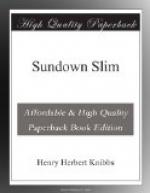It was the Senora Loring who drove to the Concho one morning and was welcomed by Corliss to whom she gave the little sack of gold. She told him all that he wished to know in regard to his brother Will, pleading for him with motherly gentleness. Corliss assured her that he felt no anger toward his brother, but rather solicitude, and made her happy by his generous attitude toward the wrongdoer. He had already heard that his brother had driven to Antelope and taken the train for the West. His great regret was that Will had not written to him or come to him directly, instead of leaving to the good Senora the task of explanation. “Never figured that repenting by proxy was the best plan,” he told the Senora. “But he couldn’t have chosen a better proxy.” At which she smiled, and in departing blessed him in her sincere and simple manner, assuring him in turn that should the sheep and cattle ever come to an understanding—the Spanish for which embraced the larger aspect of the problem—there was nothing she desired or prayed for more than the friendship and presence of Corliss at the Loring hacienda. Corliss drew his own inference from this, which was a pleasant one. He felt that he had a friend at court, yet explained humorously that sheep and cattle were not by nature fitted to occupy the same territory. He was alive to sentiment, but more keen than ever to maintain his position unalterably so far as business was concerned. The Senora liked him none the less for this. To her he was a man who stood straight, on both feet, and faced the sun. Her daughter Nell . . . Ah, the big Juan Corliss has such a fine way with him . . . what a husband for any woman! In the mean time . . . only thoughts, hopes were possible . . . yet . . . manana . . . manana . . . there was always to-morrow that would be a brighter day.
To say that Sundown was proud of his unaccustomed regalia from the crown of his lofty Stetson to the soles of his high-heeled riding-boots, would be putting it mildly. To say that he was especially useful in his new calling as vaquero would not be to put it so mildly. Under the more or less profane tutelage of his companions, he learned to throw a rope after a fashion, taking the laughing sallies of his comrades good-naturedly. He persevered. He was forever stealing upon some maternal and unsuspicious cow and launching his rope at her with a wild shout—possibly as an anticipatory expression of fear in case his rope should fall true. More than once he had been yanked bodily from the saddle and had arisen to find himself minus rope, cow, and pony, for no self-respecting cow-horse could watch Sundown’s unprecedented evolutions and not depart thitherward, feeling ashamed and grieved to think that he had ever lived to be a horse. And Sundown, despite his length of limb, seemed unbreakable. “He’s the most durable rider on the range,” remarked Hi Wingle, incident to one of his late assistant’s meteoric departures from the saddle. “He wears good.”




